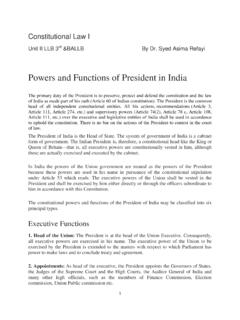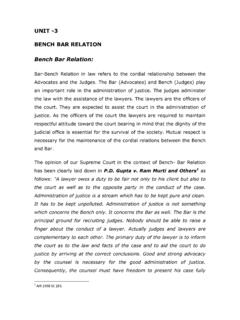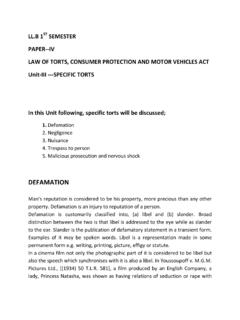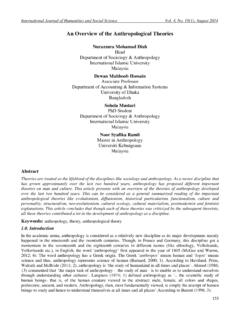Transcription of UNIT III Subjects of International Law Recognition ...
1 UNIT III. Subjects of International Law Recognition : Nature, Forms, theories and Effects Subjects of International Law Introduction Subjects of International Law can be described as those persons or entities who possess International personality . Throughout the 19th century, only States qualified as Subjects of International law. After, the Second World War, more and more new actors emerged in the International legal arena such as the intergovernmental organizations created by States, Non- Governmental Organizations (NGOs) created by individuals, multinationals and even natural persons ( individuals). These can now be considered as having to a large or sometimes limited extend the capacity to become International persons. According to Dixon a subject of International law is an individual, body or entity recognized or accepted as being capable of possessing and exercising rights and duties under International law.
2 An entity is a subject of International law if it has International legal personality . In other words, Subjects must have rights, powers and duties under International law and they should be able to exercise those rights, powers and duties. The rights, powers and duties of different Subjects change according to their status and functions. For example, an individual has the right of freedom from torture under International law and States have a duty under International law not to torture individuals or to send them to a country where there is a likelihood of that person being tortured. Legal personality also includes the capacity to enforce one's own rights and to compel other Subjects to perform their duties under International law. Remember that all Subjects of International law do not have the same rights, duties and capacities. For an example, a diplomat has immunity before foreign courts because he is an agent of the sending State.
3 theories Regarding Subjects of International Law: Following are the three theories prevalent in regard to the Subjects of International law: a) Realist Theory: Some jurists have expressed the view that only states are the Subjects of International law. In their view, International law regulates the conduct of States and only States alone are the Subjects of International law. This view has been subjected to severe criticism by jurists. According to the view expressed by Oppenheim, States are primarily, but not exclusively, the Subjects of International 1. law. To the extent that bodies other than states directly possess some rights, powers and duties in International law they can be regarded as Subjects of International law, possessing International personality . Further, International law is no longer if ever was concerned solely with states. Many of its rules are directly concerned with regulating the position and activities of individuals, and many more indirectly affect them.
4 Thus, it is wrong to say that individual is not the subject of International law. It is now generally recognised that besides States, public International organisations, individuals and certain other non-State entities are also the Subjects of International law. Many of the rules of International law are directly concerned with regulating the position and activities of the individual and many more directly affect them. Thus it is wrong to say that individuals are not the Subjects of International law. b) Fictional Theory: There are certain jurists who have expressed the view that in the ultimate analysis of International law it will be evident that only individuals are the Subjects of International law. Professor Kelson is the chief exponent of this theory. By Kelson, Individual alone is the subject of International law. The duties and rights of States are only the duties and rights of the men who compose them.
5 Many modern treaties do bestow rights or impose duties upon individuals. Kelson's view appear to be logically sound. But so far as the practice of the States is concerned it is seen that the primary concern of the International law is with the rights and duties of the States. From time to time certain treaties have been entered into which have conferred certain rights upon individuals. Although the statute of the ICJ adheres to the traditional view that only states can be parties to International proceedings, a number of other International instruments have recognised the procedural capacity of the individual. There are number of examples wherein International law applies on individual not only mediately but also directly. c) Functional Theory: This view not only combines the first and second view but goes a step ahead to include International organisations and certain other non-state entities as Subjects of International law.
6 This view appears to be more practical and is better than the other two views. The reason in support of this view are as under: (i) In present times, several treaties have conferred upon individual certain rights and duties, for example International Covenant on human rights. (ii) Geneva Convention on Prisoners of War 1949, has conferred certain rights upon the Prisoners of law. (iii)The Genocide Convention 1948, has imposed certain duties upon the individuals. (iv) It is now agreed that International organisations are also the Subjects of International law. United Nation is an International person under International law and it is held by International Court of Justice that United Nation is a subject of International law and capable of possessing rights and duties and it has capacity to maintain its right by bringing International things. (v) The law making treaties in respect of International criminal law, have imposed certain obligations upon the individuals, for example narcotic drugs convention, 1961.
7 2. Thus the states are not only the Subjects of International law. There is no doubt that states are still the main subject of International law and most of the part of International law concerns with the conducts and relationship of state with each other, but in view of the developing and changing character of the International Law, International organisations and some non-state entities and individuals are also the Subjects of International law. It is apparent from the above discussion that the position of Subjects of International law has greatly changed with the passage of time. a) State: State is the primary subject in International Law. The requirements to be considered as a subject of International law are the capacity to have rights and duties under International law. Some writers also argue that a State must be fully independent and be recognized as a State by other States. The International legal system is a horizontal system dominated by States which are, in principle, considered sovereign and equal.
8 International law is predominately made and implemented by States. Only States can have sovereignty over territory. Only States can become members of the United Nations and other International organizations. Only States have access to the International Court of Justice. According to Montevideo Convention the state as a subject of International law should possess the following qualifications: (i) Permanent population (ii) Defined territory (iii)Government (iv) Capacity to enter into relations with other States PERMANENT POPULATION: A permanent population is another necessary requirement for statehood. There are no criteria relating to the size of the population: Andorra with its 68,000 inhabitants is as much a State as India, which now has currently well over one billion inhabitants. Neither does International law set any requirements about the nature of the population: the population may largely consist of nomads (such as in Somalia), it may be ethnically (relatively) homogeneous (such as in Iceland) or very diverse (such as in the former Soviet Union), it may be very poor (such as in Sierra Leone, where in 2000 nearly 70.)
9 Percent of the population lived below the poverty line) or it may be very rich (as in many Western States). It should also be noted that the requirement of a permanent population does not relate to the nationality of a population: it merely requires that States have a permanent population. According to Brownlie it connotes a stable community with a physical basis. DEFINED TERRITORY: The development of the State is closely linked to the ability to exercise effective control over a defined territory. However, the existence of border disputes is not an obstacle to attaining statehood in International law. There is no rule stating that the boundaries of a State should be undisputed or unambiguously established. Israel for example, was admitted to the United Nations on 11 May 1949, despite its ongoing territorial disputes with the Arab States. According to O'Keefe there is no limit to size. Undefined boundaries will not matter as long as the core territory is defined.
10 With regard to the size of the territory it can be stated that no specific requirements exist: the International community of States 3. consists of both micro-States, such as Liechtenstein and San Marino and very large States such as Canada or Russia. GOVERNMENT: The third requirement for statehood, is the existence of a government capable of exercising independent and effective authority over the population and the territory. The importance that is attached to the criteria of independence and effectiveness is understandable considering the predominantly decentralized nature of International law. Since International law lacks a central executive body, with the power to enforce compliance with International obligations, compliance with International obligations must often be guaranteed by the States themselves. A State must therefore be able to the effectively and independently exercise its authority within its borders.












